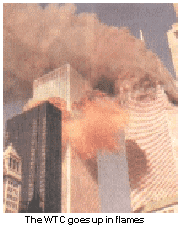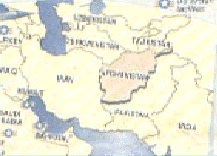No adjective would perhaps be powerful enough to convey the enormity of
the tragedy that 
befell the American people on September 11, when three hijacked planes
were crashed into the World Trade Center in New York and Pentagon in Washington
by unknown terrorists. With tens of thousands of people dead and financial
damage running into billions of dollars, the coordinated attacks on the three
important buildings have pushed Pearl Harbour to second place in America’s
catalogue of calamities. As a wounded nation America declared it would retaliate
against those who engineered the attacks and sought support from the world
nations to wage an all out war against terrorism.
Members of the UN Security Council unanimously adopted resolution calling
on all states to help bring the perpetrators to justice. The 15-member Council
in its resolution, regarded the attacks “like any act of international
terrorism, as a threat to international peace and security.” The council
called on all UN member-states “to work together urgently to bring to
justice the perpetrators, organisers and sponsors of these terrorist acts.”
It stressed that “those responsible for aiding, supporting or harbouring
the perpetrators, organisers and sponsors of these acts will be held accountable.”
Almost simultaneously, the NATO Council met in Brussels and for the first
time in the history of the alliance invoked article 5 of their Treaty, which
states that an armed attack against one or more of the Allies in Europe or
North America shall be considered an attack against them all. The NATO ministers
condemned terrorism as a serious threat to peace and stability and reaffirmed
their determination to combat it in accordance with their commitments to
one another, their international commitments and national legislation. They
said the NATO allies stand ready to provide the assistance to the US that
may be required as a consequence of these acts of barbarism.
Reports that the hijackers were Arabs or Arab-Americans sent a were of
anger in US and Europe against Arabs and Muslims. President Bush in his first
utterances after the tragedy declared the United States “at war”
against barbarians who led the terrorist strikes on New York and Washington
and called the Saudi dissident Osama bin Laden prime suspect in the attacks.
“We’re at war,” said Bush, and asked his top national security
aides to plan “sweeping, sustained, and effective” retaliation
for the attacks. “The conflict will not be short,” he said five
days after the attacks in the US. For the first time, Bush confirmed what
senior US officials had been saying all week: bin Laden, a Saudi extremist
who allegedly runs a global terrorist network from bases in Afghanistan,
“is what we would call a prime suspect.” “If he thinks he
can hide and run from the United States and our allies, he will be sorely
mistaken,” Bush told reporters, vowing to do “whatever it takes…
for as long as it takes” to hunt down and punish those responsible.
The President also warned the countries which harboured the terrorists
or gave them protection of action by the US.  He
specifically mentioned the Taliban regime in Afghanistan which had given
shelter to Osama and his men and asked them to turn over Osama to the US
for trial. America also asked Pakistan for cooperation and help in tracking
down Osma and his protectors. Arab nations while condemning the terrorist
attacks on US urged Washington to be careful in how it retaliates. They also
insisted on a settlement of the Palestinian-Israeli conflict which would
help ward off terrorism.
He
specifically mentioned the Taliban regime in Afghanistan which had given
shelter to Osama and his men and asked them to turn over Osama to the US
for trial. America also asked Pakistan for cooperation and help in tracking
down Osma and his protectors. Arab nations while condemning the terrorist
attacks on US urged Washington to be careful in how it retaliates. They also
insisted on a settlement of the Palestinian-Israeli conflict which would
help ward off terrorism.
The fallout from attacks were at the heart of talks on September 18, in
Egypt between President Hosni Mubarak and Jordan’s King Abdullah II,
as well as at the core of meetings in Saudi Arabia on September 17, between
Arab League chief Amr Mussa and Omani Foreign Minister Yussef bin Alawi.
Mussa said that the Arab countries supported the United States in its war
on terrorism, but had reservations about military operations against countries
suspected of backing terrorism, such as Afghanistan. Mubarak believes, the
United States must be careful in retaliating for the attacks and in taking
steps to build a coalition of countries fighting terrorism. Mubarak also
reiterated his call for an international conference to draft an anti-terrorism
convention.









